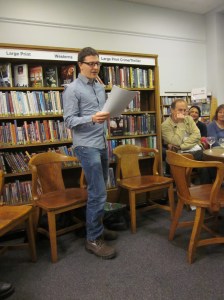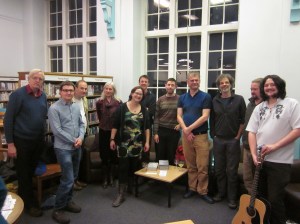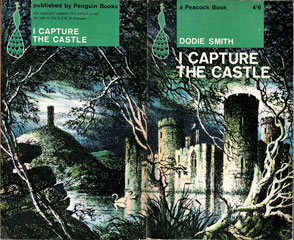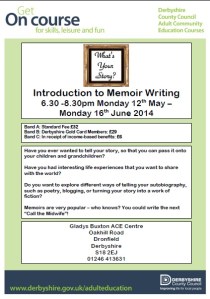- Patrick Rose
- Gavin Extence
- Writers at Walkley Library
For the past three years, I’ve played a major part in organising an event for Off the Shelf, Sheffield’s literary festival, which runs for three weeks in Sheffield throughout the city. Two years ago, I ran my own memoir writing course, and last year, I led a storytelling walk for families in the beautiful Rivelin Valley on a beautiful autumnal day.
Over the past year, I’ve become involved as a volunteer for Walkley Carnegie Library, my local library. Due to council cuts, many libraries in Sheffield now rely on volunteers to keep running. Ironically, because the volunteers are so passionate about the library, the range of events and services available is wider than ever, from pre-school storytelling, to knitting clubs and book sales. In March, I helped out at the launch of local bestselling author Gavin Extence’s new novel, The Mirror World of Melody Black. That gave me an idea. What about an event that showcased the talents of Walkley’s writers?
Walkley is an underrated suburb of Sheffield, in my opinion. The houses are mostly small terraces, sliding downhill towards the Rivelin valley on one side and the tram tracks running towards Hillsborough on the other, but there are some much larger older houses with huge gardens. All sorts of people live here – those who’ve lived in Walkley for generations, young professionals, families and students who appreciate a quieter life than they’d get down the hill in Crookesmoor. Yet, in May, the doors of many Walkley houses, big and small, open at the beginning of May for the annual Open Up event. Lots of artists live here, working hard in attic bedrooms and studios. There are lots of writers too, which I’ve realised by gradually meeting and chatting to people. Walkley is a hotbed of quiet creativity. We need to connect with each other, and encourage the new writers of the future.
Working with volunteer events co-ordinator Annie Bore, we planned an Off the Shelf event with something to appeal to writers and readers of all ages, and put in our funding bid to Off the Shelf, to start us on our way. We called the event “Be a Writer, See a Writer, Hear a Writer”, as people would get the chance to do all three during the course of the day!
Our funding bid was successful, so I contacted local writers and started planning the publicity. I’ve spent the last few weeks madly pinning up posters, tweeting, posting the event on Facebook and emailing everyone I know who is interested in creative writing. Back at the library, ticket sales looked slow. Late last week, I was panicking slightly. What if no one came? Would the writers I’d involved in the event be upset if no one turned up? Would the other library volunteers think I hadn’t planned the event well? In the end, the only thing to do was to keep spreading the word about the event, through word of mouth, emails, posters, and social media.
I woke up on Saturday morning feeling very nervous. I’d dropped the Usborne books for the book stall off the day before, along with my typewriter and decorations for the library, which made things easier, but as soon as we’d set up, the rain started pouring down outside. Throughout the course of the morning, only a few families visited the library. However, I did use my typewriter to write some lovely stories with children: one about a little girl helping some butterflies to fly home safely in the rain under her umbrella; and the other about an evil Spiderman battling Captain America and the Hulk. We also played giant scrabble and painted sparkly letters to be hung on a washing line around the children’s library. Young Adult author Sarah Dalton also joined us for the morning, and donated some books to the library.
The writing workshops went well, although I had been a bit worried about numbers. This gave me an excuse to join in with them, which was no problem for me! We had some amazing young writers from local schools, and a special mention must be made to a friend from Oxfam stewarding, who joined us all the way from Worcester for the day. Daniel Blythe gave us a masterclass in developing stories by using settings, and inventing characters using photographs and a “character map” to help us to plan. Creative writing is something that everyone should be able to do – not necessarily for a living! But it’s great to flex your imagination and develop new ideas. Daniel works regularly in schools to prove just that. In a world where some children think that the most important thing a story needs to start with is a capital letter, imagination can be a rare commodity.
Poet Rob Hindle inspired us to bring historical characters and events alive in poetry. We started off by imagining historical characters who didn’t quite make it, such as Shakespeare’s frustrated actor brother, who ended up as an “extra” in William’s plays, and the wife of Isambard Kingdom Brunel, who didn’t like tall hats. We read a selection of poems by Martin Espada and Eevan Boland that dealt with historical themes and characters before starting some of our own.
We each picked a photograph or painting from a historical scene, and Rob asked us a series of questions about the picture. We had to write descriptions of what was happening, details we didn’t notice at first; what sounds could be heard. Then we used our answers to construct a poem. It was a great idea, and we all came out with an interesting, dramatic first draft of a poem.
There was time for a quick trip home to eat, before heading out again for the evening event. The other library volunteers had organised everything really well – refreshments and room arrangements were all in place, and the only thing I needed to do was to help carry a few more chairs, as people kept arriving, and shortly after 7pm, the library looked like a real literary soiree!
The open mic slot was fully booked, and we were treated to short excerpts of everything from humorous haiku, novel extracts, short stories, to poems about the black hole under the cooker where everything disappeared. Next, Fay Musselwhite, Chris Jones and other poets from Longbarrow Press enthralled us with poems about families, landscape and long journeys.
Folk musician Patrick Rose had the audience absolutely captivated with his songs – drawing on the folk traditions of the Childe ballads, and his own compositions, particularly ‘Paradise Square’, about a forgotten piece of Sheffield history. Patrick sang on his own and accompanied by his beautiful guitar playing, and we were spell-bound.
Finally, novelist Gavin Extence gave us an exciting exclusive extract from his third novel – the first time he’s shared any of it in public. We really enjoyed it, and when it’s a bestselling novel, like his previous books, The Universe Versus Alex Woods and the Mirror World of Melody Black, we’ll be able to say that we heard it first!
At the end of the evening, I was pleased and relieved that I’d pulled it off – I had organised a miniature literary festival! People really enjoyed it, and it gave a wide variety of writers a chance to perform their work. The experience of putting on an event is always nerve-wracking, but it’s also addictive. We’re already starting to think about other literary events that Walkley Carnegie Library could host, so watch this space!










